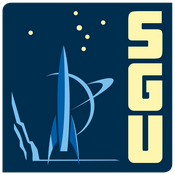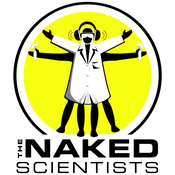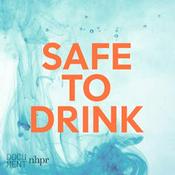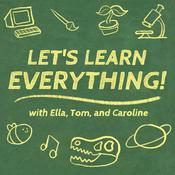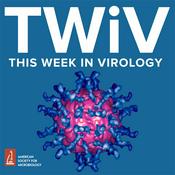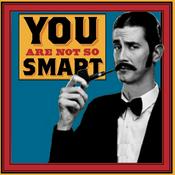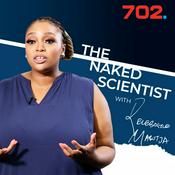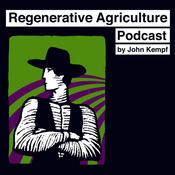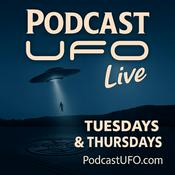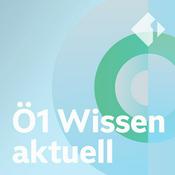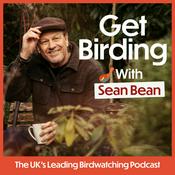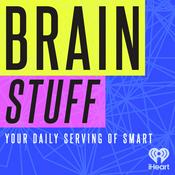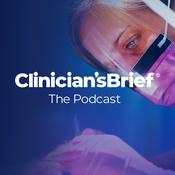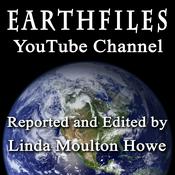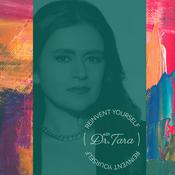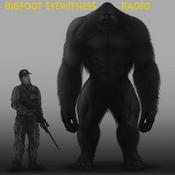198 episodes
Farm Management for the Future - Managing for Health, Welfare, and Performance with guests: Dr. Trevor DeVries, University of Guelph; Dr. Jackie Boerman, Purdue University; Dr. Juilio Giordano, Cornell University; Dr. Corwin Nelson, University of Florida
2026/2/17 | 2 mins.This episode’s guests were speakers on a Hot Topic Panel titled “Farm Management for the Future - Managing for Health, Welfare, and Performance” at the 2025 ADSA annual meeting.
Dr. Nelson gives some background on how the Hot Topic Panel idea came to be and introduces the rest of the guests. (1:07)
Dr. Devries describes his research program in dairy cattle behavior and nutrition, particularly using behavior as a metric for understanding nutrition and housing management and using automated tools. He has particular expertise in automated milking systems. He envisions incremental adoption of various automated tools to replace human labor in the manufacturing of milk. He predicts this will manifest not only in automated or robot systems, but also in increased automation in a traditional parlor system as well. (5:01)
Dr. Boerman, a nutritionist, collaborates with Dr. Amy Reibman, an engineer, at Purdue to research the use of video analytics on dairy farms. Projects include video prediction of cow intake and cow body weight combined with milk production information in an effort to make improvements in feed efficiency. She emphasizes that technology needs to be used across a large number of farms without disrupting the farm. The panel talks about what technologies are currently available, challenges in identifying individual cows, and specific issues created for technology in a dairy farm environment. Dr. Boerman notes that a collaborative effort with colleagues of different expertise leads to the most optimal outcomes. (15:42)
Dr. Giordano talks about monitoring systems for reproduction, health, and welfare. Wearable sensors are a good example of a technology that can be used to monitor both reproduction and health, as well as aspects of nutritional management. The goal of many research programs in this area is to touch cows as little as possible, yet intervene as early and intensely as possible with cows who truly need intervention. An intervention could be a treatment to ameliorate or reduce clinical signs, or it could be a preventative intervention that prevents the cow from developing a clinical health disorder. More work is needed to refine algorithms and integrate data, as well as distilling the data into what is most valuable to make the best predictions at the most reasonable cost. (34:08)
The panel further discusses the challenges of data integration, adequate internet and power access on farms, human error for manual data entry, and future training challenges for dairy farm and allied industry employees.(38:32)
Panelists share their take-home thoughts. (52:26)
Please subscribe and share with your industry friends to invite more people to join us at the Real Science Exchange virtual pub table.
If you want one of our Real Science Exchange t-shirts, screenshot your rating, review, or subscription, and email a picture to [email protected]. Include your size and mailing address, and we’ll mail you a shirt.Management of Genetic Diversity for Future-Proofing Dairy Breeding; Dr. Maltecca, North Carolina State University; Dr. Huson, Cornell University; Dr. Macciotta, University Di Sassari; Dr. Baes, University of Guelph; Dr. Mapholi, University of South Africa
2026/2/10 | 53 mins.Genetic resilience and the dynamics of inbreeding and diversity in dairy breeding. Dr. Maltecca (6:43)
The main issues in managing genetic diversity in dairy cattle include inbreeding depression and continuing selection without exhausting the available variability in the population. These are difficult to investigate in a breeding population, as there is not a model algorithm where there is the luxury of designing an experiment. Dairy cattle closely resemble one another, so it is difficult to distinguish between the effect of selection from the effect of drift and the effect of deleterious mutation accumulation in the population. Researchers find proxies to estimate inbreeding and inbreeding depression because we don’t have good estimates of dominance effects.
Identifying genetic diversity within indigenous and highly commercialized breeds for improved performance and future preservation. Dr. Huson (12:24)
Dr. Huson covered four steps of thinking about genetic diversity in cattle: characterization of the genetic diversity, biological understanding of why we should preserve diversity, utilizing our understanding of diversity in breeding programs, and preserving and reassessing diversity over time.
Harnessing indigenous African breeds for sustainable dairy production: Opportunities for crossbreeding to accelerate genetic improvement. Dr. Mapholi (16:52)
Dr. Mapholi emphasized the importance of tick and disease resistance for the sustainability of the African dairy industry. The indigenous African breeds had been overlooked due to small frame size and the perception they were not suitable for commercial farming, but they have excellent tick and disease resistance. Exotic breeds from the US and Europe struggled with the harsh environment. Crossbreeding indigenous and exotic breeds is allowing for simultaneous improvement in milk production and disease resistance. Genomics is particularly helpful to identify the best candidate breeds for crossing.
Genomic- versus pedigree-based inbreeding: 2 sides of the same coin. Dr. Macciotta (24:19)
It was thought that genomic selection would help in slowing the increase of inbreeding because we were looking at the DNA of the animal, not their pedigree. However, the traditional top animals were the population from which genomic selection began, and genomic selection shortens generation interval, so inbreeding continues to increase at a faster rate. Genomics offer new tools for investigating inbreeding, but there are 10-15 options to calculate inbreeding, all of which could provide a different answer. With pedigree selection, there is only one measurement of inbreeding. We are still investigating the best method for calculating inbreeding using genomic tools.
Managing genetic diversity: Strategies for sustainable livestock improvement. Dr. Baes (27:53)
Genomic selection has increased the speed at which animals become more related. There are negative implications of inbreeding, but today, the genetic and economic gains achieved through the current intense directional selection still far outweigh the inbreeding issues. No one knows where the edge of the cliff is, however. Dr. Baes envisions an international system one day where academia, AI companies, and producers all work together to understand and manage genetic diversity in livestock.
The panelists discuss key takeaways they got from the other speakers’ presentations and give perspectives on the topic of genetic diversity for their particular country and field of study. (34:58)
Panelists share their take-home thoughts. (46:10)
Please subscribe and share with your industry friends to invite more people to join us at the Real Science Exchange virtual pub table.
If you want one of our Real Science Exchange t-shirts, screenshot your rating, review, or subscription, and email a picture to [email protected]. Include your size and mailing address, and we’ll mail you a shirt.A Forensic Look at Chelated Minerals with Stephen Ashmead, Senior Fellow for Chelates - Balchem; Dr. Bill Weiss, Professor Emeritus, The Ohio State University
2026/2/03 | 1h 1 mins.Host Scott Sorrell begins the episode by setting expectations for a science-first conversation on chelated trace minerals, noting panelist affiliations while emphasizing that the discussion is grounded in research, not promotion. Stephen Ashmead, Senior Fellow for Chelates with Balchem, shares the origins of chelated mineral technology through Albion Laboratories, founded in 1956 by his grandfather, Harvey Ashmead, after recognizing challenges with mineral absorption. The conversation also introduces Dr. Bill Weiss of The Ohio State University and co-host Dr. Maria Spinola, who brings both veterinary and applied nutrition perspectives to the discussion. (00:08)
The panel explains chelated minerals from a chemistry standpoint, describing how organic ligands form stable ring structures around trace minerals, helping protect them from antagonists in feed and water. The discussion also extends beyond dairy into human nutrition, including examples such as magnesium and iron, highlighting how mineral interactions affect absorption across species. (09:20)
Dr. Weiss and Dr. Spinola discuss emerging research showing that mineral sources can influence rumen and intestinal microbial populations. The group also explores how inorganic minerals can accelerate the degradation of vitamins A and E in premixes, particularly over time and under heat, whereas organic minerals are largely inert and help preserve vitamin potency. (14:20)
The panel acknowledges the difficulty of trace mineral research due to limited biomarkers and subtle performance responses. They emphasize the importance of using averages for forage mineral contributions rather than relying on single samples, and caution against assuming zero mineral supply from forages. (25:00)
A candid discussion centers on over-supplementation, with consensus that many diets exceed trace mineral requirements, particularly for copper and vitamins. Dr. Weiss explains the difference between requirements and recommendations, noting that modest safety margins are justified to account for biological variability, but feeding two to three times the requirements increases cost and risk without clear benefit. (37:57)
The episode concludes with a warning against “too-good-to-be-true” organic mineral products, explaining why unusually high metal percentages often indicate inferior chemistry. The panelists emphasize that mineral quality, ligand structure and supplier credibility are important in the long term. The panel's final takeaways reinforce feeding minerals thoughtfully, enough to meet needs, but not in excess. Lastly, you need to consider the microbiome effects, vitamin stability and consistency in delivery when feeding these mineral products. (49:41)- Greg Nye introduces himself and Mountain View Dairy, where he manages three facilities and associated farm ground. He outlines the design and construction timeline of their fully enclosed feed center and shares the three primary benefits behind the project: reduced shrinkage, improved ration consistency, and enhanced employee safety. (1:41)
Greg explains how external receiving and intentionally separated traffic flows eliminate cross-traffic between loaders and delivery trucks, which significantly improves safety and efficiency. The group discusses early design considerations, lessons learned from other operations, and how “R&D” (rob and duplicate) helped shape the final layout of the facility. (2:32)
Scott and Walt introduce footage showing how feeds are received, stored, and staged. Greg walks through the grain elevator, unloading, conveyor systems, bay storage, and handling efficiencies that minimize ingredient touches. (5:03)
Greg explains how strategic ingredient placement and facility layout shorten cycle time for high-use ingredients while maintaining flexibility for premixes and specialty feeds. He then goes into inventory management strategies, including rotating bins, tracking shrinkage, and maintaining ingredient freshness. (6:32)
The conversation shifts to dust control and shrink reduction, highlighting the enclosed facility design and the use of an industrial baghouse system to recapture nutrients. Feed processing is simplified by reducing complex operations to just a few controls. Greg highlights the impact of reducing corn handling to a single touch and how it accelerated ROI. (8:28)
Finally, Greg discusses ration delivery innovations, including feed staging on conveyors and a custom delivery box that allows multiple loads to be staged and delivered efficiently. He shares how learning from other operations and refining those ideas to fit their scale and how it played a critical role in designing a system that maximizes efficiency without sacrificing flexibility. (15:08)
As we look ahead, join us for the next Real Producers Exchange on Tuesday, February 17, 2026, featuring Skylar Gerke, an Arizona dairyman with Midwestern roots. Skylar brings a unique perspective on what it’s like to transition from Midwest dairying to operating in the West. Registration is now open at balchem.com/real-science or agproud.com/real-producer. And as always, thank you to Walt for riding shotgun once again, and to our loyal listeners—thanks for being part of the journey. (20:39) Dairy Welfare with guests: Dr. Elsa Vasseur, McGill University; Jessica St John, Lactanet & University of Guelph
2026/1/20 | 45 mins.This episode’s guests were speakers on the Joint ADSA-CSAS Breeding and Genetics Symposium:
Dairy Welfare—Breeding and Management Strategies at the 2025 ADSA annual meeting.
Jessica’s talk was titled “Herd Sustainability Index: Using milk recording data to evaluate dairy herd sustainability.” This index provides a national percentile ranking benchmark for producers relative to sustainability from DHI data. The index evaluates ten indicators in four major categories: longevity and culling, feeding and production, heifers, and health. (2:51)
Dr. Vasseur’s talk was titled “Improving welfare through inclusive innovation: The story of WELL-E.” This inclusive innovation delivers data-driven solutions with and for the Canadian dairy industry by integrating stakeholder and domain knowledge with cutting-edge tools and methods of the improvement of animal and human welfare. (4:48)
Dr. Vasseur talks about the development of the Code of Practice for the Care and Handling of Dairy Cattle, which was published in 2023. This most recent code of practice included recommendations and requirements for more opportunities for movement for dairy cattle, particularly those in tie stall environments. Dr. Vasseur’s lab has conducted research in this area to help dairy producers with possible modifications of stalls and other recommendations to improve cow comfort. Jessica describes her master’s research in tie stall modifications. The guests go on to talk about how often cows in tie stalls bump into their stall, some proof-on-concept research looking at doubling stall size, and recommendations for cow comfort improvements in existing tie stall operations. (6:53)
Dr. Vasseur discusses the relationship between cow comfort and longevity. She also talks about the realities of converting a tie stall barn to a free stall barn. (20:12)
Jessica describes the indicators used in the Herd Sustainability Index in more detail. A minimum of six tests in the last 12 months with 50% of the cows being recorded are needed to calculate the index for a farm. Seven of the ten HSI indicators are required for the index to be calculated. She goes on to explain how producers can see their index compared to the rest of Canada as well as historical change in their index, and details an incentive program for high-indexing and most-improved herds. (24:07)
Dr. Vasseur talks about cow comfort and welfare comparisons among intensive dairy production countries. She envisions the development and implementation of technology to allow for more automation and reduced observer bias of processes such as lameness evaluation. (30:30)
So what is WELL-E? Dr. Vasseur gives some background and details about bringing together animal scientists, computer scientists, and stakeholders to develop cutting-edge tools for the improvement of animal and human welfare. (33:24)
Jessica talks about her PhD research in dairy cow behavior and pasture management. She conducted a study where pastures were mowed the morning of grazing compared to conventional grazing. Cows in the mowed pastures spent more time ruminating and drank more water, but no differences in milk production or milk components were observed. (38:02)
Panelists share their take-home thoughts. (43:07)
Please subscribe and share with your industry friends to invite more people to join us at the Real Science Exchange virtual pub table.
If you want one of our Real Science Exchange t-shirts, screenshot your rating, review, or subscription, and email a picture to [email protected]. Include your size and mailing address, and we’ll mail you a shirt.
More Science podcasts
Trending Science podcasts
About Real Science Exchange-Dairy
Listen to Real Science Exchange-Dairy, The Rest Is Science and many other podcasts from around the world with the radio.net app
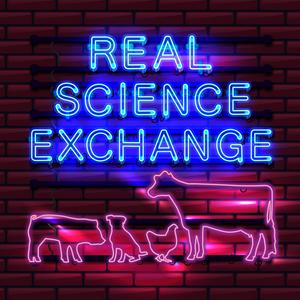
Get the free radio.net app
- Stations and podcasts to bookmark
- Stream via Wi-Fi or Bluetooth
- Supports Carplay & Android Auto
- Many other app features
Get the free radio.net app
- Stations and podcasts to bookmark
- Stream via Wi-Fi or Bluetooth
- Supports Carplay & Android Auto
- Many other app features


Real Science Exchange-Dairy
download the app,
start listening.







